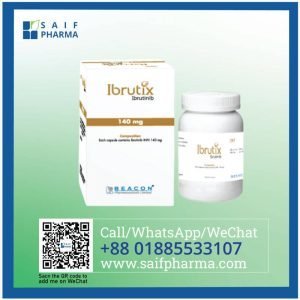Sunitix 50 mg (Sunitinib)
Product Name: Sunitix
Generic Name : Sunitinib
Formulation: Capsule
Available Pack Size: 28’s
Available Strengths: 12.5 mg, 25 mg & 50 mg
Categories: Oncology, Tyrosine kinase inhibitor
Manufacturer: Beacon Pharmaceuticals Ltd.
Indications
Gastrointestinal Stromal Tumor (GIST): Sunitinib is indicated for the treatment of gastrointestinal stromal tumors after disease progression on or intolerance to imatinib mesylate.
Advanced Renal Cell Carcinoma (RCC): Sunitinib is indicated for the treatment of advanced renal cell carcinoma.
Advanced Pancreatic Neuroendocrine Tumors (pNET): Sunitinib is indicated for the treatment of progressive, well-differentiated pancreatic neuroendocrine tumors in patients with unresectable
Therapeutic Class
Targeted Cancer Therapy
Pharmacology
Sunitinib inhibits cellular signaling by targeting multiple receptor tyrosine kinases (RTKs).
These include all receptors for platelet-derived growth factors (PDGF-Rs) and vascular endothelial growth factor receptors (VEGFRs), which play a role in both tumor angiogenesis and tumor cell proliferation. The simultaneous inhibition of these targets, therefore, reduces tumor vascularization and triggers cancer cell apoptosis and thus resulting in tumor shrinkage.
Sunitinib also inhibits CD117 (c-KIT), the receptor tyrosine kinase that (when improperly activated by mutation) drives the majority of gastrointestinal stromal cell tumors. It has been recommended as second-line therapy for patients whose tumors develop mutations in c-KIT that make them resistant to imatinib, or who cannot tolerate the drug.
In addition, sunitinib binds to other receptors. These include RET, CD114, and CD135. The fact that sunitinib targets many different receptors leads to many of its side effects such as the classic hand-foot syndrome, stomatitis, and other dermatologic toxicities.
Dosage & Administration
Recommended Dose For GIST And RCC: The recommended dose of Sunitinib for gastrointestinal stromal tumor (GIST) and advanced renal cell carcinoma (RCC) is one 50 mg oral dose taken once daily, on a schedule of 4 weeks of treatment followed by 2 weeks off (Schedule 4/2). Sunitinib may be taken with or without food.
Recommended Dose For pNET: The recommended dose of Sunitinib for pancreatic neuroendocrine tumors (pNET) is 37.5 mg taken orally once daily continuously without a scheduled off-treatment period. Sunitinib may be taken with or without food.
Dose Modification: Dose interruption and/or dose modification in 12.5 mg increments or decrements are recommended based on individual safety and tolerability. The maximum dose administered in the Phase 3 pNET study was 50 mg daily.
Strong CYP3A4 inhibitors such as ketoconazole may increase sunitinib plasma concentrations. The selection of an alternate concomitant medication with no or minimal enzyme inhibition potential is recommended. A dose reduction for Sunitinib to a minimum of 37.5 mg (GIST and RCC) or 25 mg (pNET) daily should be considered if Sunitinib must be co-administered with a strong CYP3A4 inhibitor
CYP3A4 inducers such as rifampin may decrease sunitinib plasma concentrations. The selection of an alternate concomitant medication with no or minimal enzyme induction potential is recommended. A dose increase for Sunitinib to a maximum of 87.5 mg (GIST and RCC) or 62.5 mg (pNET) daily should be considered if Sunitinib must be co-administered with a CYP3A4 inducer. If a dose is increased, the patient should be monitored carefully for toxicity
Interaction
Increased plasma cone with strong CYP3A4 inhibitors (eg ketoconazole, ritonavir, itraconazole, erythromycin, clarithromycin, grapefruit juice). Decreased plasma cone with strong CYP3A4 inducers [eg rifampin, dexamethasone, phenytoin, carbamazepine, phenobarb, St. John’s wort (Hypericum perforatum)]. Anticoagulants eg warfarin, and acenocoumarol (periodically monitor platelets, prothrombin time/INR & physical exam).
Contraindications
Hypersensitivity, Renal impairment
Side Effects
Fatigue, GI disorders, skin discoloration, rash, palmar-plantar erythrodysesthesia, dry skin, hair color changes, mucosal inflammation, asthenia, dysgeusia, anorexia, HTN, neutropenia.
Pregnancy & Lactation
Pregnancy Category D. There is positive evidence of human fetal risk based on adverse reaction data from investigational or marketing experience or studies in humans, but potential benefits may warrant the use of the drug in pregnant women despite potential risks.
Overdose Effects
Treatment of overdose with Sunitinib should consist of general supportive measures. There is no specific antidote for overdosage with Sunitinib. If indicated, the elimination of unabsorbed drugs should be achieved by emesis or gastric lavage. Cases of accidental overdose have been reported; these cases were associated with adverse reactions consistent with the known safety profile of Sunitinib, or without adverse reactions. A case of intentional overdose involving the ingestion of 1,500 mg of Sunitinib in an attempted suicide was reported without adverse reaction. In non-clinical studies, mortality was observed following as few as 5 daily doses of 500 mg/kg (3000 mg/m²) in rats. At this dose, signs of toxicity included impaired muscle coordination, head shakes, hypoactivity, ocular discharge, piloerection, and gastrointestinal distress. Mortality and similar signs of toxicity were observed at lower doses when administered for longer durations.







